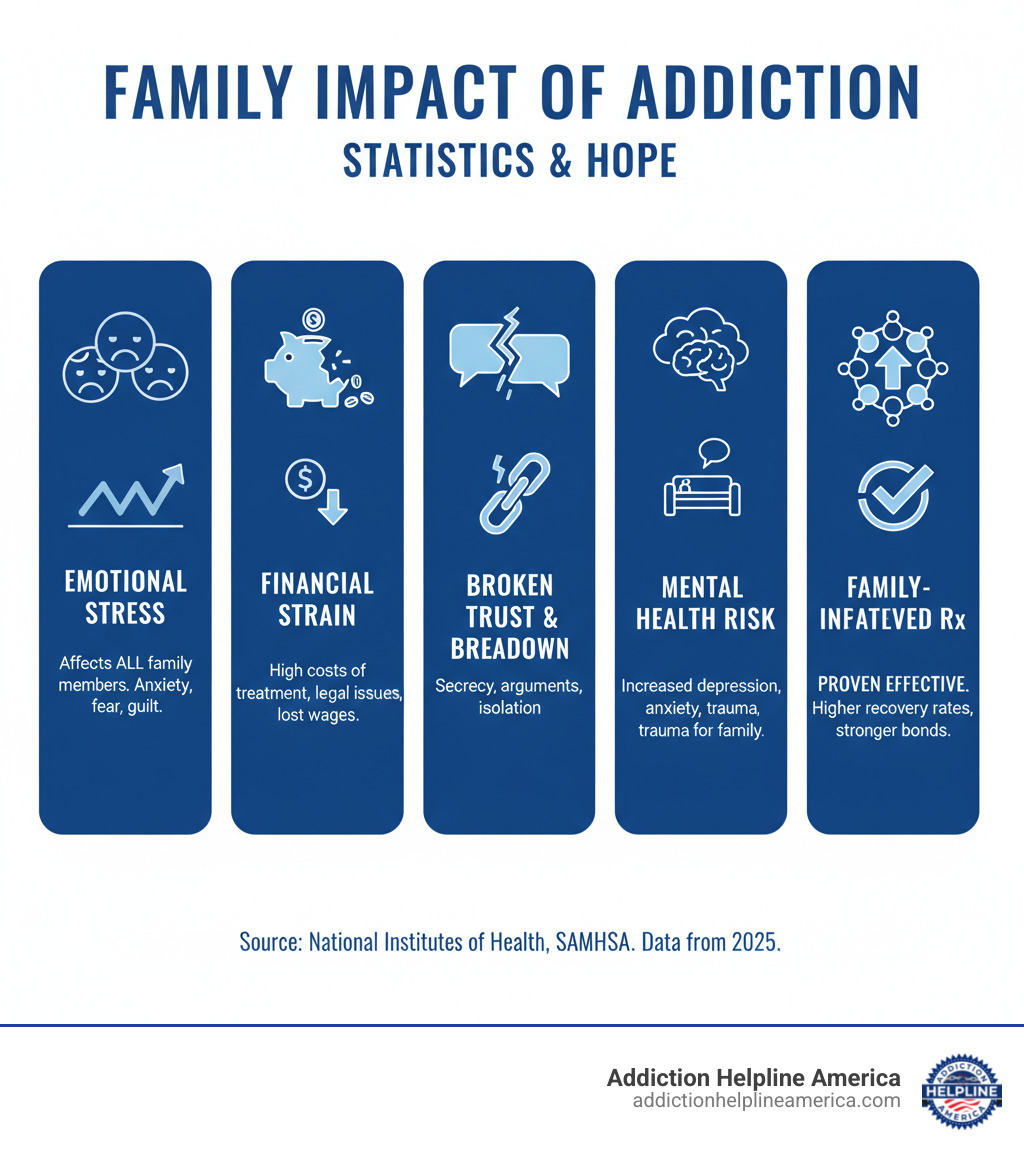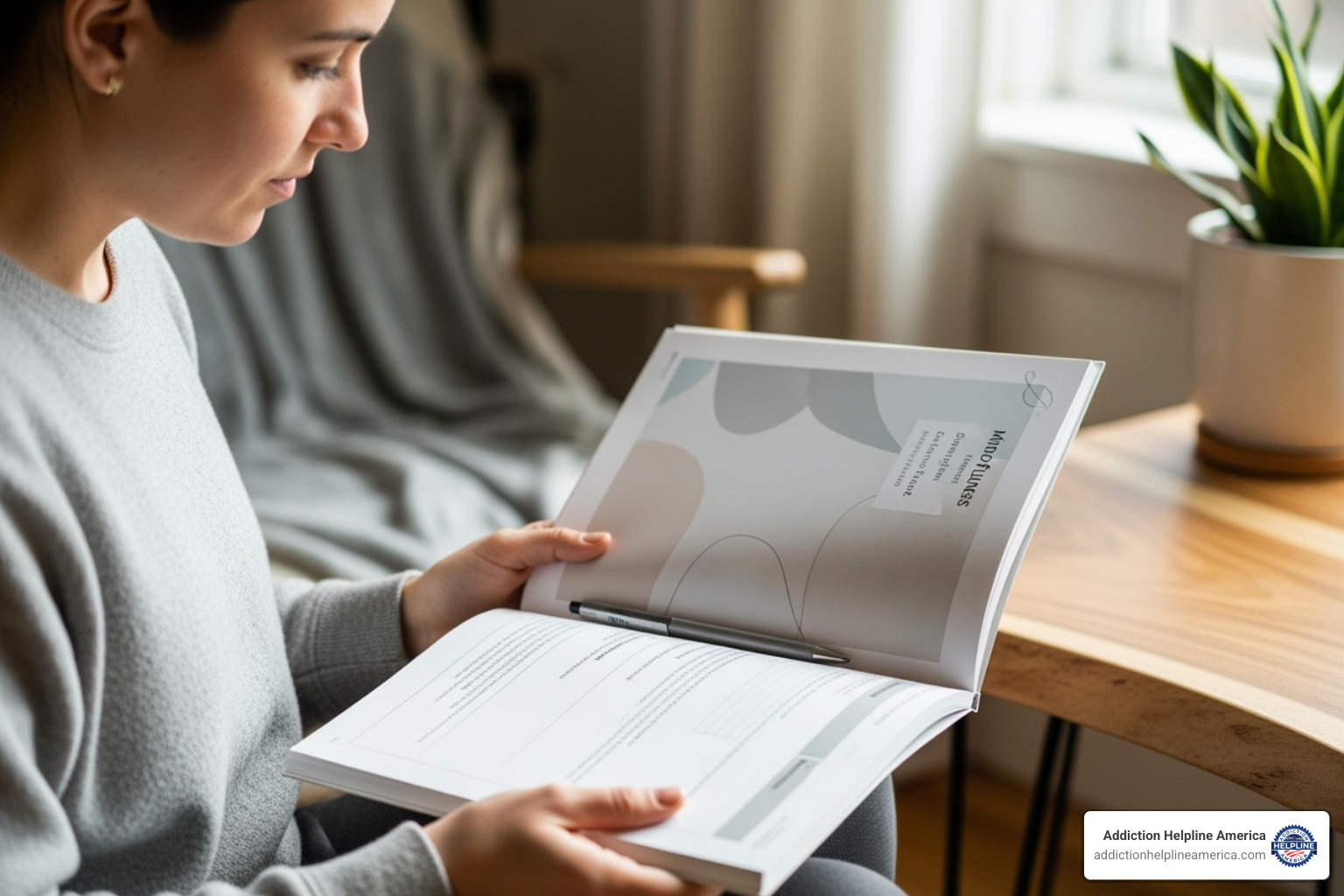
Why Recovery for Families is Essential to Healing
Recovery for families is not just about the person struggling with addiction—it’s about healing the entire family unit. When a loved one battles substance use disorder, the impact ripples through every relationship, causing emotional trauma, financial strain, and broken trust. Yet there is hope: with the right support and resources, families can heal together.
If you’re searching for recovery for families support, here are the key resources available:
- Support Groups: SMART Recovery Family & Friends, Al-Anon, and Nar-Anon
- Educational Resources: Free online courses, handbooks, and webinars
- Professional Services: Family therapy and treatment navigation assistance
- Digital Tools: Telehealth options, online meetings, and helplines
- Self-Care Programs: Individual counseling and parent coaching
As one family program participant noted, “I learned that addiction is an illness that affects everyone in the family, and it affects how we interact with one another.” This truth underlies everything we know about addiction recovery: it is a family disease that requires family healing.
By the time most families seek help, the situation is often at a crisis level. Less than 9% of young people with a substance use disorder receive treatment, leaving families desperate for guidance.
At Addiction Helpline America, we support families through every stage of recovery, connecting you with compassionate resources and evidence-based guidance. Our team understands your journey requires both immediate support and long-term tools for rebuilding trust and creating lasting change.
This guide will walk you through the challenges families face, practical strategies for supporting your loved one while caring for yourself, and the comprehensive resources available to help your family heal together.
The Ripple Effect: How Addiction Impacts the Entire Family
When a loved one struggles with addiction, it creates waves of change and pain that can feel overwhelming. This ripple effect touches everyone in the family.
You might find yourself lying awake at night, wondering if your loved one is safe. The emotional toll is exhausting—a constant mix of stress, anxiety, fear, anger, guilt, and love. One day you’re hopeful; the next, you’re heartbroken. Recovery for families isn’t just about helping your loved one get better; it’s about recognizing that everyone in the family has been affected and needs healing.
Practical challenges also pile up. Financial strain becomes a constant companion due to job loss, treatment costs, or legal bills. Communication breaks down, and conversations feel like walking through a minefield. Trust erodes with each broken promise, blurring the line between helping and enabling.
Children, siblings, partners, and parents all face unique struggles, from taking on inappropriate roles to feeling betrayed, alone, or responsible. Yet, understanding these ripple effects is the first step toward taking meaningful action and rebuilding resilience together.
Unique Challenges for Families
When addiction enters your home, you face a heavy and often invisible burden. Living in a constant state of stress and anxiety becomes the new normal, taking a toll on both your emotional and physical health. The shame and stigma surrounding addiction often push families into isolation at the very moment they need support the most.
Navigating the treatment system is complex and confusing. At Addiction Helpline America, we offer personalized guidance to help you find the right path forward. Many family members also carry deep feelings of guilt and helplessness, wondering if they could have prevented it. It’s vital to understand that you are not to blame. Your own journey toward healing is just as important as your loved one’s recovery.
Understanding Problematic Behaviors
Understanding that addiction is a chronic brain disease, not a moral failing, can change everything. It fundamentally alters decision-making, judgment, and impulse control. Your loved one isn’t choosing to hurt you; their brain is literally working against them.
This is especially true for young people, as the adolescent brain’s decision-making centers are still developing well into the mid-20s. Research on the adolescent brain and risk-taking helps explain this vulnerability.
This scientific perspective helps you separate the person from the behavior. The person you love is still there, struggling with a disease. This doesn’t excuse harmful behavior, but it allows you to respond with both compassion and firm boundaries. The more you understand about addiction, the more effective you can be in your own recovery for families journey, using strategies grounded in science rather than frustration.
Supporting Your Loved One Without Losing Yourself
When addiction enters your family, it’s easy to let your own needs fall by the wayside. But the truth is, you cannot pour from an empty cup. Like the safety demonstration on an airplane, you must secure your own oxygen mask before helping others. If you’re running on fumes, you won’t have the strength to be the steady presence your loved one needs. This isn’t selfish; it’s about creating a foundation where real healing can happen for everyone.
Strategies for Effective Support
Supporting someone through addiction requires balancing love with boundaries. Here’s how:
- Practice positive communication: Use “I” statements to express your feelings without blame. For example, say “I feel scared when you don’t come home” instead of “You always worry us.”
- Set healthy boundaries: Boundaries protect your well-being. This might mean not lending money or not allowing substance use in your home. They are about self-respect, not punishment.
- Avoid enabling behaviors: Enabling comes from love but removes the natural consequences that can motivate change. It’s painful to step back, but sometimes necessary.
- Encourage treatment without ultimatums: You can’t force recovery, but you can make resources available. Approaches like Community Reinforcement and Family Training (CRAFT) teach you how to motivate your loved one effectively. Addiction Helpline America can connect you with these programs.
- Celebrate small steps: Recovery isn’t a straight line. Acknowledge every bit of progress, no matter how small. This recognition can fuel hope.
The Critical Importance of Self-Care
When a loved one is in crisis, your world can shrink. Regaining control of your own life is essential to recovery for families. This means making deliberate choices to care for yourself.
- Prioritize your health: Basics like nutritious meals, adequate sleep, and regular exercise are not luxuries; they are essential for your mental and physical well-being.
- Make time for personal enjoyment: Reconnect with hobbies and activities that bring you joy. These moments of respite are anchors that keep you grounded.
- Connect with trusted people: Break the isolation by sharing your experiences with supportive friends, family, or support groups.
- Seek individual therapy: A therapist can provide a safe space to process complex emotions and develop coping mechanisms.
- Educate yourself: Learning about addiction as a brain disease can transform feelings of helplessness into understanding and empowerment.
Finally, remember the Three C’s—a truth that has liberated countless family members:
- You didn’t Cause it.
- You can’t Control it.
- You can’t Cure it.
These words release you from a burden you were never meant to carry. What you can do is take care of yourself, set healthy boundaries, and focus on your own healing journey. That’s where your power truly lies.
A Comprehensive Guide to Resources for Recovery for Families
When your family is affected by addiction, finding the right support can feel overwhelming. The good news is that a wealth of resources is available for recovery for families, from peer groups to professional services. At Addiction Helpline America, we know that the right resource at the right time can transform a family’s journey. This section is your roadmap to those vital support systems.
Peer and Community Support Systems
Connecting with people who have been where you are can be incredibly powerful. Peer support offers the comfort of shared experience.
- SMART Recovery Family & Friends provides free, science-based support meetings for those affected by a loved one’s addiction. Led by trained facilitators, these meetings offer practical tools to help you regain control of your life. You can Find a SMART Family & Friends Meeting online or in person.
- Parent-to-parent support, offered by organizations like Families for Addiction Recovery (FAR), connects you with other parents who have walked this path. Research shows these family peer advocates are highly effective.
- Online support groups are a lifeline for many, creating safe spaces to share experiences and receive practical advice anytime.
Educational Tools for understanding recovery for families
Knowledge is power when dealing with addiction. Understanding the science helps you make informed decisions.
- The SMART Recovery Family & Friends Handbook and Worksheets offer evidence-based, actionable strategies to help you develop coping skills and set personal goals.
- The Centre for Addiction and Mental Health (CAMH) offers free online courses, such as “Empowering Families Affected by Substance Use Problems.” You can BROWSE COURSES on mental health and addiction at your own pace.
- Learning newsletters and parent information series from regional organizations provide science-based information to help you support positive change.
Finding Professional Treatment and Support
While peer support is valuable, professional guidance is often essential. You don’t have to figure it out alone.
- Family Resource Centres, like those at CAMH, help families steer the complex mental health system.
- Individual therapy for family members provides a confidential space to process emotions and develop coping strategies.
- Family therapy focuses on improving communication, resolving conflict, and rebuilding trust for the entire family unit.
- Community Reinforcement and Family Training (CRAFT) is a proven method that teaches families how to motivate a loved one to enter treatment while improving their own quality of life.
At Addiction Helpline America, we specialize in providing free, confidential, personalized guidance to help you find the right recovery program from our extensive network. Our team can help you understand treatment options and connect with services that fit your family’s specific needs. For more info about navigating treatment options, reach out to us today.
The Science of Healing: Why Family Involvement in Treatment Works
When families wonder if their involvement makes a difference, decades of research provide a resounding yes. Scientific evidence shows that recovery for families working together yields significantly better outcomes.
Statistics paint a sobering picture: in 2019, less than 9% of young adults with a Substance Use Disorder received any treatment. This highlights the need to use every available resource—and families are one of the most powerful.
Research shows that family-based treatment has “top-shelf effectiveness.” A meta-analysis found that family involvement led to a meaningful and enduring reduction in substance use, with effects lasting 12-18 months after treatment. When families participate, the entire family system becomes healthier.
| Component | Individual-Focused Treatment Outcome | Family-Involved Treatment Outcome |
|---|---|---|
| Treatment Engagement | Lower engagement rates, especially for resistant individuals | Significantly higher engagement rates (e.g., CRAFT superior to usual care) |
| Substance Use Reduction | Varied, often dependent on individual motivation | Small but enduring reduction in frequency (meta-analysis data: 5.7% reduction over 12-18 months) |
| Relapse Rates | Higher potential for relapse without external support | Improved long-term outcomes due to supportive environment |
| Family Well-being | Often overlooked, leading to burnout and stress | Improved coping, reduced stress, improved communication for family members |
| Overall Recovery | Primarily individual-driven, may lack sustained support | Holistic, sustained recovery for individual and family unit |
Key Components of Effective Family Programs
Successful family programs actively teach skills and change how family members interact. Key components include:
- Family skills training: Teaches practical abilities like clear communication, managing emotions, and collaborative problem-solving.
- Improving communication: Focuses on listening and expressing needs without attacking to rebuild trust.
- Addressing family relationships: Helps families recognize and change unhealthy dynamics.
Community Reinforcement and Family Training (CRAFT) is a standout evidence-based method that teaches families how to encourage treatment entry, even when a loved one is resistant. For youth, Youth Opioid Recovery Support (YORS) is a promising family-centered approach that combines education with shared decision-making. To learn more, you can explore scientific research on family-involved treatments.
Leveraging Technology for family recovery support
Technology has made recovery for families more accessible than ever, breaking down barriers of distance and time.
Telehealth and video therapy allow families to access professional support from home, which is especially helpful for those in rural areas. Digital recovery support services, including online platforms and mobile apps, offer self-help tools, interactive exercises, and virtual communities for on-demand assistance. A systematic review of digital interventions confirms the potential of these tools to improve recovery outcomes.
At Addiction Helpline America, we accept these technological advances while recognizing that personal human connection remains irreplaceable. Technology should improve support, not replace the warmth of genuine understanding.
Frequently Asked Questions about Family Recovery
When facing addiction in your family, it’s normal to have questions and feel uncertain. Here are answers to some of the most common questions we hear about recovery for families.
How do I talk to my loved one about their addiction?
Starting this conversation is difficult, but approaching it with love rather than judgment is key. Here are some tips:
- Focus on “I” statements: Express your feelings without blame. Say, “I feel scared when…” instead of “You always…”
- Express concern, not judgment: Your loved one likely already feels shame. They need to hear that you care about their well-being.
- Choose a calm time: Never have this discussion during an argument or when they are under the influence. Find a quiet, private moment.
- Offer support without pressure: Share information about treatment options, but respect their autonomy. Any step to reduce harm is a positive one.
What if my loved one refuses to get help?
This is a painful and common situation. While you cannot force an adult into treatment, you are not powerless. Your own healing can begin now.
- Focus on your own well-being: Join a family support group like SMART Recovery Family & Friends or seek individual therapy. This is essential for your survival.
- Implement healthy boundaries: Protect yourself and other family members by setting clear limits, such as not providing money for substances or covering up for their actions.
- Explore programs like CRAFT: Community Reinforcement and Family Training is designed for this exact situation. It teaches you how to change your interactions to encourage treatment entry without confrontation.
How can I advocate for better addiction treatment and policy?
Your experience can help drive systemic change and reduce the stigma that prevents others from seeking help.
- Join advocacy groups: Organizations like Families for Addiction Recovery (FAR) work to reform policy and amplify the voices of families.
- Share your story with legislators: Personal stories are powerful. Contact your elected officials to explain how addiction has impacted your family and what resources are needed.
- Support policies that increase access to care: Advocate for better healthcare funding, expanded access to evidence-based treatments like MOUD, and insurance parity for mental health.
- Reduce stigma by talking openly: Every honest conversation chips away at the shame and silence surrounding addiction, giving others the courage to seek help.
At Addiction Helpline America, we’re here to support you through every step, connecting you with resources that fit your family’s unique situation.
Conclusion
Living with a loved one’s addiction can feel like being caught in an endless storm. But we want you to know that recovery for families is not just possible—it happens every single day.
Addiction is a family disease, but healing can also ripple through the entire family. When families learn to communicate, set boundaries, and support each other, the entire dynamic begins to shift for the better.
This guide has walked you through the challenges you face and the powerful tools at your disposal, from support groups and educational resources to professional services. Most importantly, we’ve emphasized that taking care of yourself is essential. Remember the three C’s: you didn’t cause it, you can’t control it, and you can’t cure it. But you can heal.
Science confirms that family involvement in treatment works, improving outcomes for everyone. The road ahead may not always be smooth, but there will be moments of connection, small victories, and a gradual rebuilding of trust and hope.
You don’t have to walk this path alone. At Addiction Helpline America, we cut through the confusion to connect you with resources that fit your family’s unique situation. We provide free, confidential, personalized support to help you find treatment for your loved one, explore family therapy options, or simply talk to someone who understands.
Healing and rebuilding bonds is possible. For more info about finding the right recovery program for your family’s journey, reach out to us today. We’re here to help you find your way forward.
Our helpline is 100%
free & confidential
If you or someone you care about is struggling with drug or alcohol addiction, we can help you explore your recovery options. Don’t face this challenge alone—seek support from us.
Programs
Resources
Will my insurance
cover addiction
treatment?
We're ready to help
Find the best
drug or alcohol treatment
center
Are you or a loved one struggling with addiction? Call today to speak to a treatment expert.
















